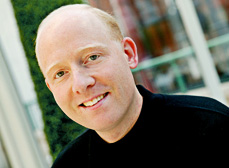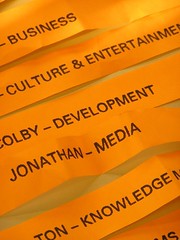
"Google's algorithms are optimized to produce the greatest advertising revenue to Google Inc. in the short-term and the greatest shareholder value to GOOG in the long-term."
Peter prefers Yahoo! Mindset because "it uncovers the hidden bias and puts the user in charge of the algorithms. Algorithmic openness is a great strategy for Yahoo! I'm not sure Google can maintain its algorithmic secrecy indefinitely without consequence. I'm in favor of more transparent, user-configurable algorithms."
Peter believes that "What We Find Changes Who We Become." He brings to light many of the issues we face with RFID, collective intelligence and the simple reality of finding what we really want.
Read the interview and then have a read through Peter's article "Authority".
Gene Smith also blogs on You're IT - a blog on tagging.
























